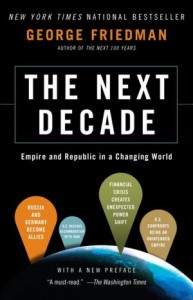Carpe Librum: George Friedman’s ‘The Next Decade’

“A century is about events. A decade is about people.”
This is how George Friedman, author of “The Next Decade: Empire and Republic in a Changing World” begins his work on the future of the American Empire.
In this nonfiction work, the CEO of the world’s leading private intelligence company investigates the inner machinations of American society and politics. He then applies them to predict the nation’s next 10 years.
But his methods are exceptional and interesting to read, overall. For example, he builds his predictions on the premise that most theorists fail to see the metaphorical forest for the trees.
That is, they seem to subscribe to the volatility of the short term.
In many cases, the human beings who are the leaders of world powers are subject to unexpected moments of both brilliance and ineptitude. In the long run, however, the cycle of events tend toward congruence.
By playing off the overall course of human events, then, Friedman narrows his scope from centuries to a mere 10 years and from the world as a whole to the hegemonic United States.
Many may object to a perceived ethnocentrism or Ameri-centric bias in this starting point, but the author is careful to argue that America is the only rational starting point because of its eminent position of world power. He makes his case well.
With the basis of his theory firmly established, Friedman proceeds to examine the impact of current decision-making on the world as a whole through the lens of the long term.
The result is fascinating, if you happen to be into world power games, politics and international relations. If you do not fall into that category, I’m afraid this is not the book for you.
But for my fellow social scientists, I have to say this is a book worth reading, if for nothing more than a refreshing new theory.
Maybe Friedman is wrong. It could be his predictions fall disastrously short, but something tells me that he knows what he is writing about.
His understanding of the relation of both long- and short-term decision-making to world politics makes a historian proud because he knows to note the cyclical characteristic of the past and uses it to the best advantage in the presentation of his ideas.
On the book’s lower notes, I have to say that his reasoning, like history, is sometimes repetitious. He belabors some points far beyond what is necessary.
That said, the positive aspects far outweigh the negatives. Friedman’s writing is coherent and comprehensible for anyone with a basic knowledge of political theory. His expressed opinions and judgments of American leaders seem fair and balanced, and well grounded in research.
Finally, his ideas seem novel enough to stave off any “I’ve heard all this before” boredom.
This book is an excellent introduction to the next decade’s geopolitical culture, and I completely recommend it to anyone seeking something a bit more than some light reading.

